Electrical & Electronics Engineering
Labs
The department gives a rich exposure to all kinds of practical aspects related with Electrical and Electronics Engineering. The department also has adequate numbers of laboratories that are beyond the prescribed syllabus of our affiliated university.
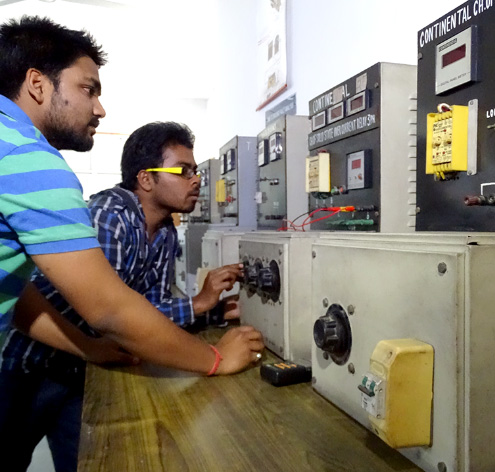
Power System Lab
As per new university norms, there are experiments based on simulation. Simulation based experiments are MATLAB Software based. The Lab is equipped with computers having MATLAB software to perform simulation based experiments. Hardware based three are six experiments namely: IDMT Panel, Differential Relay (Percentage), Cable Fault Locator, Negative Sequence Reactance, Zero Sequence Reactance, Sub Transient Direct Reactance Sub Transient Quadrature Reactance.
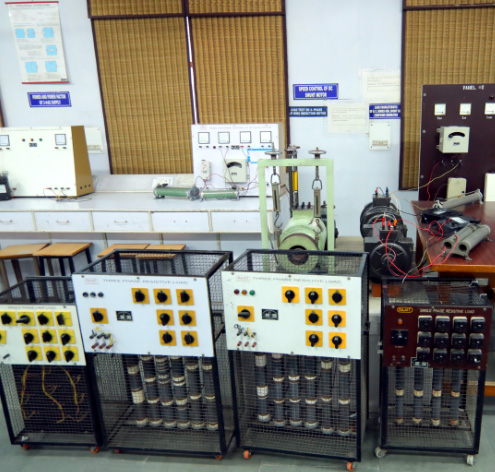
Electrical Machine and Automatic Control Lab
This lab fulfills the requirements such as EMEC-I, EMEC-II and EMAC (ME) Labs in the University curriculum of II & III year students. This lab contains all the experiments on DC & AC machines and transformers, as per the University curriculum such as Swinburne test for testing of transformer, V-curve of Synchronous motor, load test on the DC motor & generator, synchronization of alternators, no-load & blocked rotor test of 3-phase induction motor. The lab also contains a D.C. Source of 220V/68A for smooth conduct of the experiments in the lab. We also have some experiments which go beyond the syllabus like no-load and blocked rotor under variable frequency, negative & positive reactance calculation, etc.
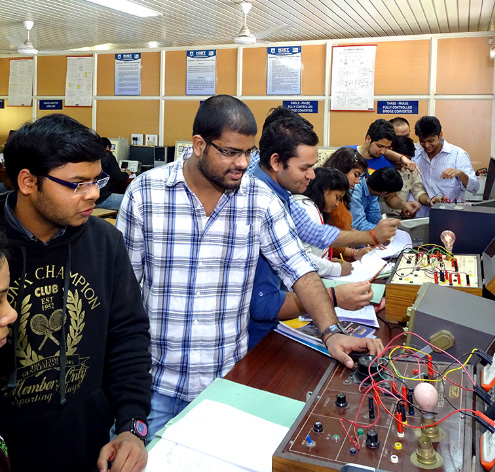
Power Electronics Lab
Power Electronics Lab is utilized by 1. B. Tech VI Semester EN students for Lab EEE-651. 2. M. Tech (Power Electronics & Drives) First Semester students for Power Converter - I lab 3. M. Tech (PE&D) II Semester students for Power Converter - II lab. 4. B. Tech VII and VIII Semester students for project work. 5. M. Tech IV Semester students for their project work. The lab is equipped with 12 hardware setups consisting of all types of power convertors, DSP 2407 trainer kit as a controller and digital storage oscilloscopes for measurement. Further the lab has MATLAB, and 5 user Power Sim simulation software (PSIM).
Electrical Measurement Lab
In Electrical Measurement lab, various parameters (e.g. Temperature, pressure, capacitance, Resistance etc.) are analyzed and measured with the help of different modules (AC&DC Bridges and Embedded systems). We have a simulation software - Lab VIEW by National Instrument in this lab for live simulation and control of parameters like Temperature, pressure, voltage & current, which gives students a better understanding and helps them to explore the area concerned. Another Embedded unit we have in this lab is PLC trainer Kit, which deals with the industrial applications and brings a better understanding to our students. A few experiments which can be performed on PLC are : PLC based Tank Level control, PLC based Lift control, Star Delta Control etc.
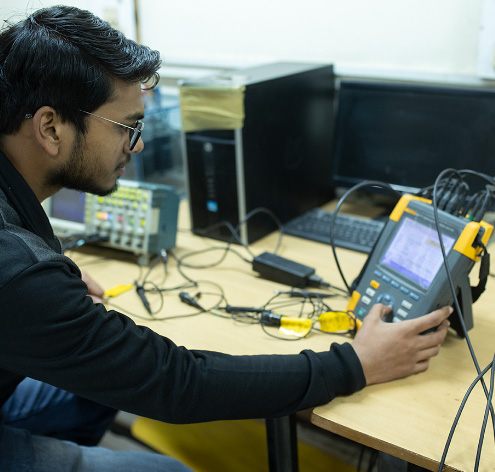
Electronics Lab
Electronics lab caters to the needs of facilities in electronics field by training its students to make a valuable contribution. This lab is used by B. Tech students. It helps students to enhance their knowledge about various Analog and Digital electronics equipment both passive as well as active. In this lab, the study of various rectifiers, FET and transistors is done. Ii is also used for designing of various oscillators, summer, integrator circuits and multi-vibrator using operational amplifier IC. This Laboratory is fully equipped with the required instruments such as C.R.O., Multimeters, signal Generator, etc. to conduct experiments with digital ICs for UG students. It helps students to enhance their knowledge about various electronic equipment like shift registers, counters, adders, subtractors and seven segment display devices, etc. This lab is very essential for students to learn the theoretical concepts by designing circuits practically. The objective of this lab is to prepare its students for a good foundation in electronics field so that they become graduates and effective systems engineers.

Integrated Circuit Lab
Integrated Circuit Lab has been set up with the objective of providing facilities to the students to concentrate more on the design issues. The laboratory manual sets the guidelines, complements the theory, develops a design procedure and sets the specifications for design and also for a wide range of Analog and Digital circuits and systems so as to enable a designer/engineer to meet the requirements of design and analysis of practical circuits.
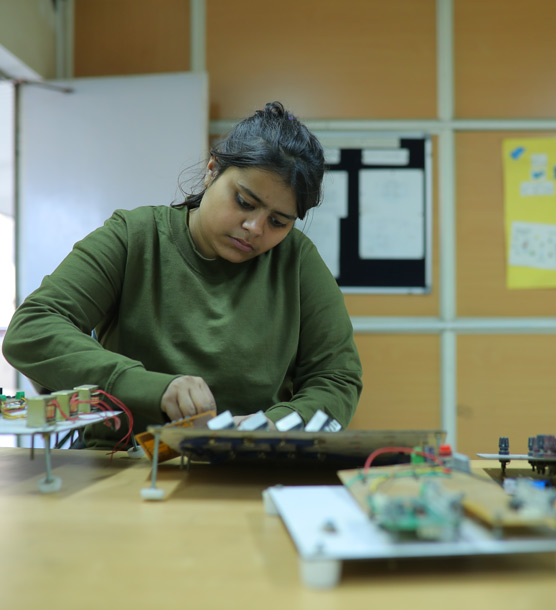
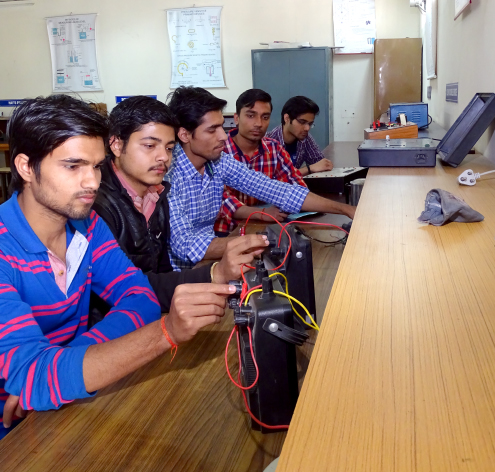
Control Systems Lab
Control Engineering is of significant interest in most areas of the industry. Control Systems applications are playing an important role in the developing world, making it crucial for the students to be exposed to contemporary control systems equipment in a realistic manner. In order to connect the theoretical material taught in lecture courses with the realities of physical hardware and simulation. To achieve this goal, Control Systems laboratory has been set up on the 2nd floor in the Department of Electrical Engineering. This laboratory provides for undergraduate as well as post graduate students, a test bed to learn and practice fundamental concepts of control systems. Students perform the experiments as per the list of experiments suggested by the university.
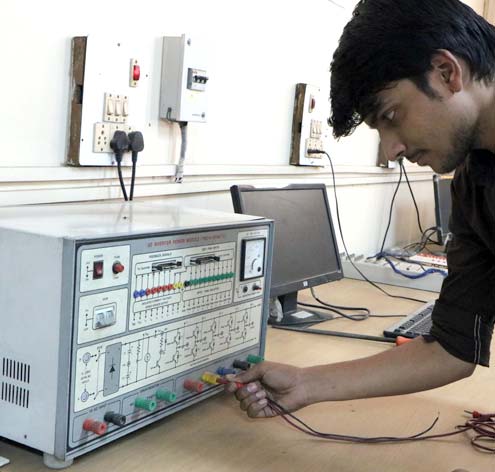
Electric Drive Lab
The Drives lab caters to the needs of M. Tech students. The Lab has both AC and DC drives based experiments. A few experiments are : five-phase induction motor drive, closed loop PMSG - DC motor set up, matrix converter, PMSM drive, BLDC drive etc. The Lab is equipped with TMS320F2812 DSP from Texas Instruments for motor control applications. This lab is a very essential part of electrical engineering as it contains facilities which are used by the B. Tech and M. Tech students while carrying out the various hardware projects.
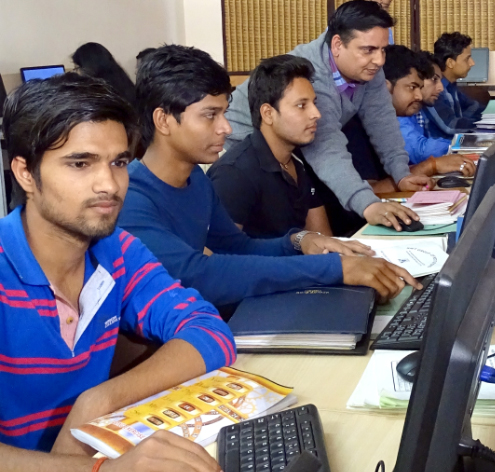
Computer Aided Design Lab
CAD Lab caters to the needs of the advanced facilities in "what-if" analysis for Electrical and Electronics Engineers. This lab consists of software MATLAB and PSPICE. The versatile nature of MATLAB allows "what-if" analysis that can be used to strengthen the students understanding of electrical & electronics. MATLAB is useful in analyzing data obtained from the laboratory experiments. In addition, it has been found that the interactive nature of MATLAB and its immediate graphing facilities are especially useful in enhancing the understanding of concepts and principles of electrical and electronics engineering fundamentals. SPICE is one of the most successful circuit simulation programs. Its widespread usage attests to the applicability of the program to a large variety of circuit simulation problems. SPICE utilizes modified nodal analysis approach. It can be used for non-linear dc, non-linear transient and linear ac analysis problems. It can also be used to perform noise analysis, temperature analysis, Monte-Carlo analysis. One of the advantages of SPICE is its inclusion of device models for active devices such as diode, BJT, JFET, and MOSFET.
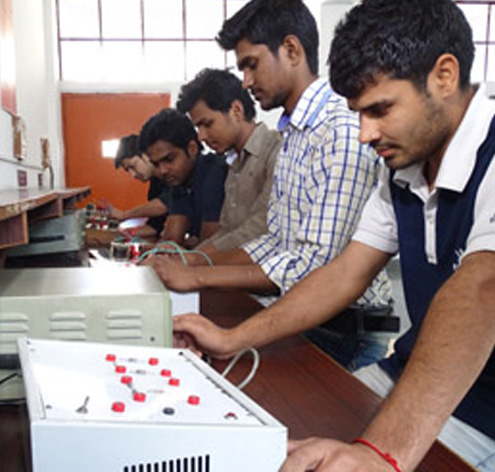
Network Lab
In the Network Lab, we analyze different electrical circuits using theorems. The circuits which are analyzed in the lab are also verified with MATLAB software. This gives students a better understanding of the problem as they can see the response of the circuit theoretically using simulation tools as well as practically by performing on actual electrical circuits. This lab is a very essential part of Electrical Engineering in which students are made familiar with the electrical connections, how they are made and practically how circuits give response. Some project work are also being carried out with the help of this lab using hardware packages.
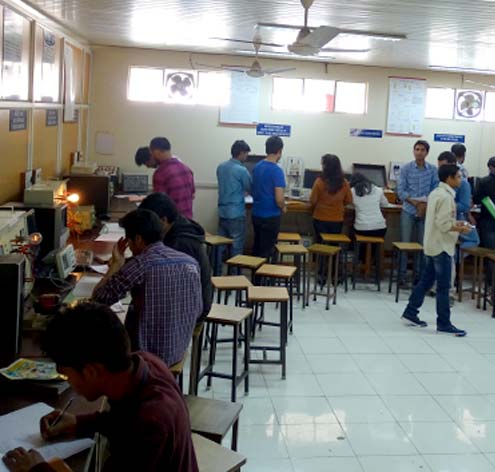
Advanced Microprocessor and Application Lab
Microprocessor Lab is well equipped with experimental set ups to teach students the programming of both 8085 and 8086 microprocessors and 8051 & PIC microcontroller. Besides experiments on basic programming the Lab has interfacing modules such as Keyboard Controller 8251, serial communication of 8086 using RS 5232, traffic light controller, stepper motor control module. Lab also has a Universal Programmer and other facilities to develop microprocessor / microcontroller based projects.
